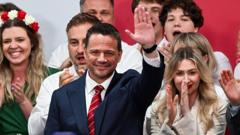The South Korean presidential race is heating up as front-runner Lee Jae-myung emphasizes a change in diplomatic strategy, potentially easing tensions with both North Korea and China, and reversing the confrontational stance taken by the former administration.
South Korea's Presidential Election: A Shift in Foreign Policy on the Horizon

South Korea's Presidential Election: A Shift in Foreign Policy on the Horizon
In a pivotal moment for South Korea, the upcoming election may reshape its diplomatic relations, especially with China and North Korea.
In the aftermath of former President Yoon Suk Yeol's controversial term, characterized by heightened hostility towards North Korea and a strained relationship with China, Lee is advocating for a more diplomatic approach. His election could usher in a new era for South Korea's foreign policy, focusing on stabilization and dialogue rather than confrontation, which previously deteriorated South Korea's standing in the region.
As Lee Jae-myung leads in the polls, he has pledged to mend ties with China, which soured under Yoon's leadership due to accusations of Chinese interference in South Korean affairs. This proposed pivot aligns with his rival Kim Moon-soo, though the emphasis on rapprochement with North Korea may distinguish Lee's approach to restoring diplomatic relations.
The election on June 3 presents an opportunity for South Korea to redefine its foreign policy priorities, with potential implications not only for its own national strategy but also for regional stability in East Asia. Analysts are watching closely, as a shift in leadership could lead to significant changes in how South Korea interacts with both its allies and adversaries.
In closing, Lee’s leadership could mark a departure from the previous confrontational stance—potentially fostering better relations with China, navigating North Korea’s provocations diplomatically, and reshaping the geopolitical landscape of the region.
As Lee Jae-myung leads in the polls, he has pledged to mend ties with China, which soured under Yoon's leadership due to accusations of Chinese interference in South Korean affairs. This proposed pivot aligns with his rival Kim Moon-soo, though the emphasis on rapprochement with North Korea may distinguish Lee's approach to restoring diplomatic relations.
The election on June 3 presents an opportunity for South Korea to redefine its foreign policy priorities, with potential implications not only for its own national strategy but also for regional stability in East Asia. Analysts are watching closely, as a shift in leadership could lead to significant changes in how South Korea interacts with both its allies and adversaries.
In closing, Lee’s leadership could mark a departure from the previous confrontational stance—potentially fostering better relations with China, navigating North Korea’s provocations diplomatically, and reshaping the geopolitical landscape of the region.





















